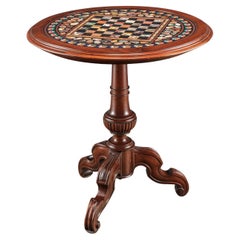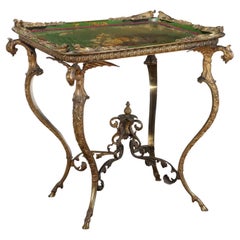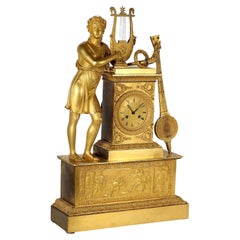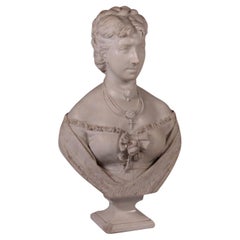Want more images or videos?
Request additional images or videos from the seller
1 of 14
Table in Semiprecious Stone, Amic Hotton 'Attributed to', 19th Century
$11,848.31List Price
About the Item
- Dimensions:Height: 29.14 in (74 cm)Diameter: 25.99 in (66 cm)
- Style:Other (Of the Period)
- Materials and Techniques:
- Place of Origin:
- Period:
- Date of Manufacture:1800s
- Condition:Wear consistent with age and use.
- Seller Location:Milano, IT
- Reference Number:1stDibs: LU1721232804222
About the Seller
4.9
Platinum Seller
Premium sellers with a 4.7+ rating and 24-hour response times
Established in 2015
1stDibs seller since 2015
434 sales on 1stDibs
Typical response time: 1 hour
Authenticity Guarantee
In the unlikely event there’s an issue with an item’s authenticity, contact us within 1 year for a full refund. DetailsMoney-Back Guarantee
If your item is not as described, is damaged in transit, or does not arrive, contact us within 7 days for a full refund. Details24-Hour Cancellation
You have a 24-hour grace period in which to reconsider your purchase, with no questions asked.Vetted Professional Sellers
Our world-class sellers must adhere to strict standards for service and quality, maintaining the integrity of our listings.Price-Match Guarantee
If you find that a seller listed the same item for a lower price elsewhere, we’ll match it.Trusted Global Delivery
Our best-in-class carrier network provides specialized shipping options worldwide, including custom delivery.You May Also Like
Exceptional 19th Century Centre Table Attributed to Holland & Sons
By Holland & Sons
Located in London, by appointment only
• One of the finest pieces of 19th century English furniture ever made
• Firmly attributed to the Royal cabinetmaker, Holland & Sons
• Made using stunning rare & exotic timbers, Th...
Category
Antique Mid-19th Century British Early Victorian Center Tables
Materials
Ormolu
$47,981
H 29.25 in W 54 in D 39.5 in
19th Century Coromandel and Inlaid Table Attributed to Jackson & Graham
By Jackson & Graham
Located in London, GB
A magnificent library table
Attributed to Jackson & Graham
Of free standing rectangular form, constructed in coromandel, with inlays in thuya, ebony, boxwood, and honeysuckle; the fluted legs rising from square brass castor-shod feet; the frieze housing two lockable drawers fitted with rare ‘tamper proof’ Chubb locks and having quadrant moulded cedar lined interiors; the platform having a central panel of beautifully chosen matched coromandel veneers, with an outer guard border of a running pattern of stylised anthemions; the ebony edges having a thumb nail moulding,
circa 1865
The firm of Jackson & Graham established in 1836 by Thomas Jackson and Peter Graham at 37 Oxford Street London, and for the next fifty years produced predominately high quality furniture and represented Britain at many of the international exhibitions. Their clients included Queen Victoria, Napoleon III, the Grand Khedive of Cairo and the royal palace in Siam. They were particularly noted for their fine marquetry work, the use of Wedgwood plaques, rare woods, and fine casting of bronze mounts. They engaged the leading designers of the period, inter alia, Owen Jones, Bruce Talbert, Alfred Lorimer and Eugene Prignot. In the mid-1850s the workforce was recorded as 250, and by 1875, the company was employing 600 workers. They were feted exhibitors at many of the Great Exhibitions of the 19th century, and frequent prize winners. At the Paris International Exhibition of 1878, the furniture jury noted of them ‘ the workmanship is so perfect that even with the aid of a magnifying glass scarcely the slightest imperfection is to be found’. In 1885 the company was absorbed by Collinson and Lock, who continued their standard of excellence.
Charles Chubb was apprenticed as a blacksmith before starting business as a ships’ ironmonger in Winchester. Jeremiah soon joined the business, and by 1818 the brothers had branched out into lockmaking, founding the famous Chubb Company.
The business really got started when Jeremiah Chubb patented his new ‘detector lock’ in 1818. The lock was constructed so that if someone tried to pick it or open it with the wrong key it became inoperable. To make the lock work again the owner had to use a special key supplied with the lock. The aim of the detector lock was to prevent burglaries, and to warn the owner that someone had tried to break into their property.
The lock soon became popular, and sales of the Chubbs’ products increased even more when they won a government competition to design a lock that could only be opened using its own key. After the invention of the detector lock, the Chubbs decided to move to Wolverhampton, which already had an established lock making industry. By 1838 they were making 28,000 locks a year at their Wolverhampton factory. Another product was added to the Chubb range in 1835 when a patent was taken out for a burglar resistant safe, and in 1837 the Chubb safe...
Category
Antique 19th Century English Tables
Materials
Brass
$102,456
H 30 in W 54.5 in D 34 in
19th Century Italian Specimen Pietra Dura Table Attributed To Giacomo Raffaelli
By Giacomo Raffaelli, Gillows of Lancaster & London
Located in London, by appointment only
One of the most important early nineteenth century specimen hardstone table tops ever created, with 373 specimens, mounted on a beautifully designed and constructed base by Gillow.
...
Category
Antique Early 19th Century Italian Regency Center Tables
Materials
Agate, Amethyst, Carnelian, Lapis Lazuli, Malachite, Belgian Black Marbl...
$53,464 Sale Price
40% Off
H 30 in Dm 39.5 in
French 19th Century Mahogany, Ormolu and Marble Table, Attributed to Dasson
By Henry Dasson
Located in West Palm Beach, FL
A stunning and extremely high quality French 19th century Louis XVI style mahogany, ormolu and vert campan marble side/center table, after a model by Adam Weisweiler and attributed to Henry Dasson. The table is raised by fine topie shaped feet with elegant circular tapered supports. Each leg displays a unique square tapered shape with a carved recessed design and elegant foliate ormolu movements which encase the leg. Each are connected by a fine mahogany stretcher with elegant beaded ormolu bands and a lovely central floral reserve. Above are impressive richly chased caryatids with lovely flowing drape and tied hair below intricately detailed floral baskets. The straight frieze displays a recessed panel framed in a fine mottled ormolu band. The frieze is centered by a charming and richly chased pierced ormolu mount with a central floral bouquet and crossed staff...
Category
Antique 19th Century French Louis XVI Center Tables
Materials
Marble, Ormolu
$59,500
H 31 in W 40 in D 24.25 in
19th Century Italian Micro-Mosaic Grand Tour Table Attributed to Roccheggiani
By Cesare Roccheggiani
Located in London, GB
A rare grand tour table
Possibly by Cesare Roccheggiani
The circular platform of marmore nero, inset with fine micromosaic panels consisting of thousands of coloured glass tesserae; a central roundel depicting The Vatican from St Peter's Square within a malachite border, surrounded by a border including four cartouches in polychrome reserves of Roman views including the Coliseum, the Roman Forum, with the remnants of the Temple of Vespasian; the Temple of Vesta, and the Pantheon, all interspersed and linked by voluminous bouquets of fruit and flowers representing the 4 seasons; the outer stylised border inlaid with deep blue tesserae evocative of exotic Lapis Lazuli. Supported on a finely carved Italian giltwood base, its design incorporating baskets of fruit and floral garlands echoing the 4 seasons theme of the table.
Italian, Circa 1875
Other table tops inspired by this design, although not as finely executed, can be found in several Russian collections (which house the greatest micromosaics) including Vorontsov Palace, Muranovo House, as well as the imperial State Hermitage Museum. A tabletop with profuse floral micromosaic work was commissioned by the Belgian Royal family (sold Sotheby's, 2003).
The floral garlands, the magnificent quality of the inlay and the use of distinct curved tesserae support the present attribution to Cesare Roccheggiani. According to Jeanette Hanisee Gabriel, the world expert on micro mosaics, curved tesserae pieces were used in foliage, grass and animal fur by only the very best mosaicists such as Roccheggiani. Evidence of curved pieces, for instance, is observed in the foreground of the Temple of Vesta cartouche, to name but one observation of the master's hand.
The scion of a dynasty of mosaicists, Roccheggiani was perhaps the most successful mosaicist in the last quarter of the nineteenth century. He is doubtless related to Lorenzo Roccheggiani, a late eighteenth-century master mosaicist at the Vatican, whose work included the altarpiece, Crucifixion of St. Peter after Guido Reni. Nicolo Roccheggiani, possibly Lorenzo's son, was also a principle artist at the Vatican, involved in executing the famous tabletop Achilles Shield...
Category
Antique 19th Century Italian Grand Tour Center Tables
Materials
Malachite, Marble, Belgian Black Marble
$129,778
H 29 in Dm 26.5 in
19th Century William IV Period Mahogany Centre Table Attributed to Gillows
By Gillows of Lancaster & London
Located in London, GB
A William IV Period Mahogany Centre Table
Attributed to Gillows
Constructed from a flamed Honduras Mahogany, book-matched with great effect on the top; the table supported on an inc...
Category
Antique 19th Century English William IV Center Tables
Materials
Mahogany
19th Century English Regency Pollard Oak Centre/Drum Table Attributed to Gillows
By Gillows of Lancaster & London
Located in Dublin, IE
A stunning early 19th century English Regency Pollard Oak drum /centre table Attributed to Gillows Of Lancaster & London. The circular top, inset with a gilt tooled leather writing s...
Category
Antique Early 19th Century English Regency Center Tables
Materials
Wood
$30,854
H 73 in Dm 120.5 in
Bamboo and wood table attributed to Perret & Vibert, France late 19th century
By Perret et Vibert
Located in Roma, RM
Bamboo and lacquered wood table attributed to Perret & Vibert, France late 19th century.
Product details
From the residence of Antonello Falqui – Falqui Collection.
Bamboo and wood c...
Category
Antique Late 19th Century French Center Tables
Materials
Bamboo, Wood
$9,137
H 25.2 in Dm 22.45 in
19th Century 'Grand Tour' Marble Top Table with Base attributed to Trotter
By William Trotter
Located in London, GB
An Impressive 'Grand Tour' Specimen Marble Top Centre Table
The base attributed to William Trotter of Edinburgh
Constructed in a finely patinated mahogany, with a Florentine Pietra ...
Category
Antique 19th Century Italian Grand Tour Center Tables
Materials
Agate, Lapis Lazuli, Malachite, Marble, Breccia Marble, Porphyry
French 19th Century Louis XVI St. Belle Époque Period Table Attributed to Linke
By François Linke
Located in West Palm Beach, FL
A stunning and extremely high quality French 19th century Louis XVI st. Belle Époque period mahogany, burl Elm, ormolu and Brèche d'Alep marble center table/desk, in the style of Fra...
Category
Antique 19th Century French Belle Époque Center Tables
Materials
Marble, Ormolu
$36,800
H 29.25 in W 47.5 in D 28.25 in
More From This Seller
View AllTable in Semiprecious Stone, Tuscany, England, Mid-19th Century
Located in Milano, IT
Circular top in marble committed, with polychrome chessboard in the center; the marble is framed in a rosewood support, supported by a central turned baluster resting on three shaped and fluted feet.
The octagonal top in polychrome marble works belongs to the Tuscan production, well known and linked to the artistic tradition linked to the Grand Ducal...
Category
Antique Mid-19th Century Italian Other Center Tables
Materials
Marble
Middle Victorian Side Table England Third Quarter 19th Century
By Jennens and Bettridge
Located in Milano, IT
Tray table , England second half of the 19th century. Made of finely chiseled and gilded bronze with papier maché top. Four uprights in the form of a winged dragon with goat's foot, ...
Category
Antique Late 19th Century English Late Victorian Center Tables
Materials
Bronze
Table Clock in Gilded Bronze, France, First Half of the 19th Century
Located in Milano, IT
Gilded and chiseled bronze clock. On the large rectangular base there is a scene with mythological divinities in relief on a finely chiseled background. Decorations with plant motifs...
Category
Antique Early 19th Century French Other Table Clocks and Desk Clocks
Materials
Bronze
Female Bust in Carrara Marble 19th century
By Non-Standard Furniture and Lighting
Located in Milano, IT
The bust depicts a noble woman, richly attired. Certainly a portrait, as is evident from the great physiognomic typification of the face; the effigy has an austere gaze and attitude,...
Category
Antique 19th Century Italian Other Busts
Materials
Carrara Marble
Document Box, Netherlands, Late 19th Century
Located in Milano, IT
Document box made of ebony veneered wood, the top contains a malachite plate with brass border with central emblem, malachite veneered feet. The plaque...
Category
Antique Late 19th Century Dutch Other Decorative Boxes
Materials
Malachite, Brass
Lady Box, England Late 19th Century
Located in Milano, IT
Briar lady's casket with brass inserts. Inside compartments with coeval glass flasks and compartments in velvet and purple silk. The opening front reveals two drawers. The lids of th...
Category
Antique Late 19th Century English Other Jewelry Boxes
Materials
Wood
Recently Viewed
View AllMore Ways To Browse
Friedman Silver Co
Gio Ponti Ice Bucket
Gucci Bottle Holder
Helena Uglow
John Wendt Medallion
Limoges Birks
Lomonosov Tea Cup
Massimo Materassi
Meriden B Silver
Mustache Tea Cup
Mustard Pot Silver Cobalt
Noritake Coffee Set
Oneida Silver Tea Set
Oneida Tea Set
Paul Revere Teapot
Tiffany Chicken
Vintage Glass Dressing Table Tray
Tiffany Ailanthus Flatware



